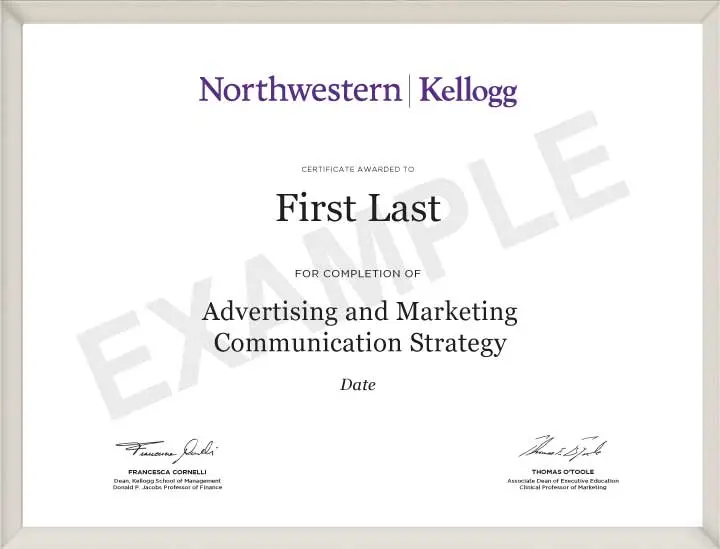Advertising and Marketing Communication Strategy
Develop a rigorous approach to persuasive brand & product communication
Kellogg is ranked No. 1 among business schools for marketing education, according to the U.S. News & World Report, 2025.
Key Takeaways
Refine your strategic lens to become more effective at guiding your company’s key messages through advertising, marketing and communication efforts. Throughout the 8-week program, you will learn to:
Create strategic, persuasive communications across platforms
Create the most meaningful strategic advertising objective to drive your business
Select and prioritize target audiences to maximize effectiveness and efficiency
Identify, evaluate, and select a consumer insight to allow you to build the right message for your target audience
Evaluate the effectiveness of media plans and identify the key steps and best practices in ad production
Evaluate ads for their strategic merit and develop proper tests
Who Is This Program For?
This program is designed for client-side managers as well as senior leaders responsible for devising an integrated marketing communications strategy that drives business results. It is ideal for:
Junior- to mid-level marketers—such as brand managers or marketing managers, or executives taking on a new marketing role—who are responsible for managing advertising efforts.
Senior executives whose responsibilities include marketing/advertising who are looking to increase the success rate of their teams in advertising communications by honing their strategic approach.
Advertising, communications, and PR consultants/agencies who seek to offer better solutions for their clients and increase client buy-in on their strategic recommendations.
Program Topics
Pathway to Becoming an Executive Scholar
Participants who successfully complete the Advertising and Marketing Communication Strategy program will accrue points towards becoming an esteemed Kellogg Executive Scholar; a unique credential that provides you the opportunity to customize your pathway to achieve your professional development goals.
Kellogg’s expansive program offerings allow you to build a variety of competencies that focus on practical application. More than about learning to lead, the path to becoming an Executive Scholar is about leading through learning.
Program Faculty

Sandy & Morton Goldman Professor of Entrepreneurial Studies in Marketing, Professor of Marketing, Co-chair of Faculty Research, Kellogg School of Management
Dr. Rucker holds the Sandy & Morton Goldman Professorship of Entrepreneurial Studies in Marketing. His primary research focuses broadly on the topics of social hierarchy, comp...

Clinical Professor of Marketing at Kellogg School of Management
Kevin McTigue is a Clinical Associate Professor of Marketing at Northwestern University's Kellogg School of Management teaching multiple classes for the MBA Program and Execut...
Testimonials

Certificate
Upon successful completion of the program, Kellogg Executive Education grants a verified digital certificate of completion to participants. This program is graded as pass or fail; participants must receive 80% to pass and obtain the certificate of completion.
After successful completion of the program, your verified digital certificate will be emailed to you in the name you used when registering for the program. All certificate images are for illustrative purposes only and may be subject to change at the discretion of Kellogg Executive Education.
Note: This online certificate program does not grant academic credit or a degree from Kellogg School of Management.
FAQs
Financing Options
Climb Credit*
We offer financing options with our partner, Climb Credit*. Click here to learn more.
*Applicable for US Residents
Flexible Payment Options For All
Flexible payment options allow you to pay the program fee in installments. Click here to see payment schedule.
Didn't find what you were looking for? Write to us at learner.success@emeritus.org or Schedule a call with one of our Program Advisors or call us at +1 315 502 3308 (US) / +44 128 291 1923 (UK) / +65 3129 4131 (SG)
Early registrations are encouraged. Seats fill up quickly!
Flexible payment options available.
Starts On

